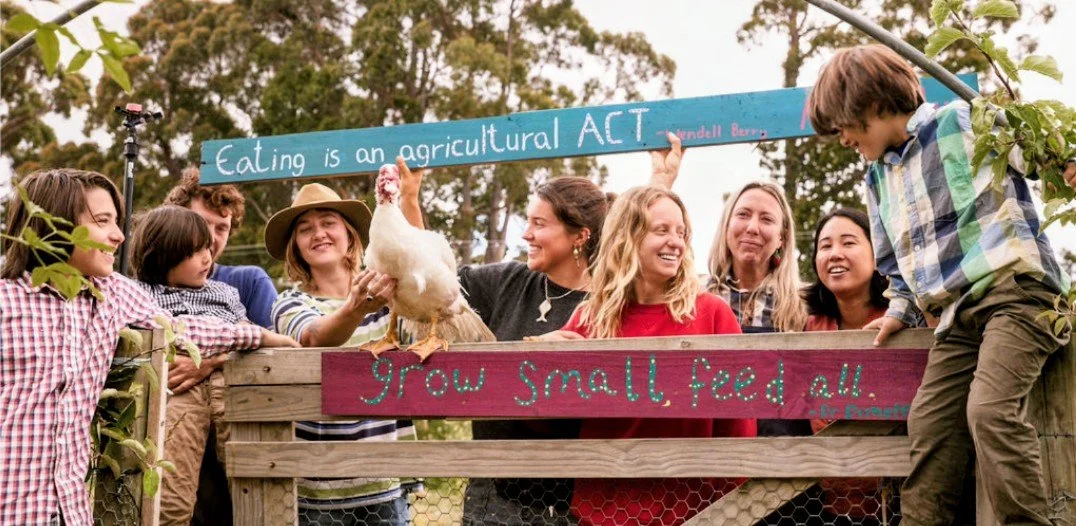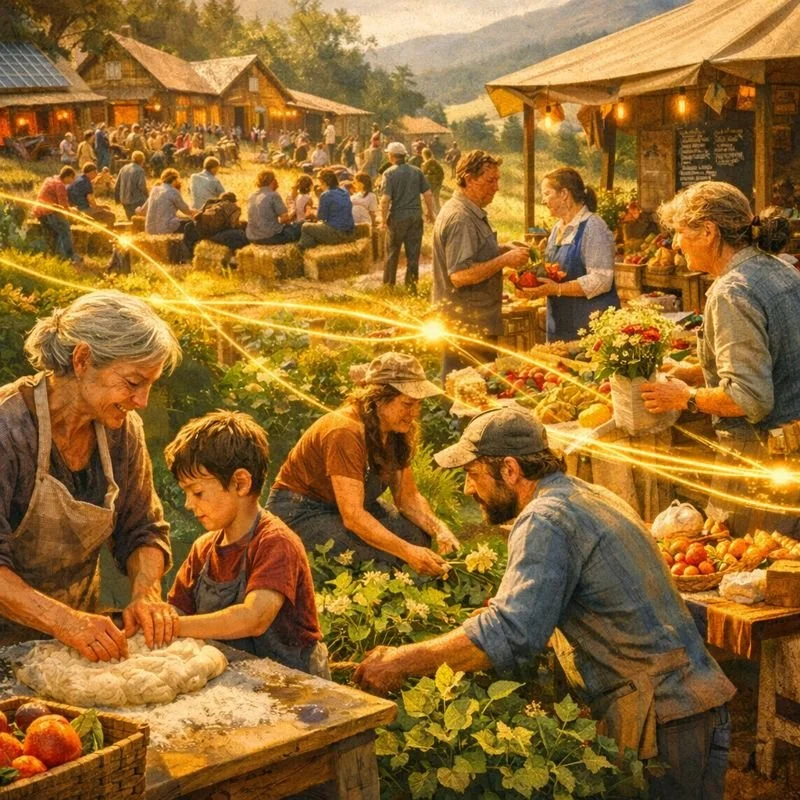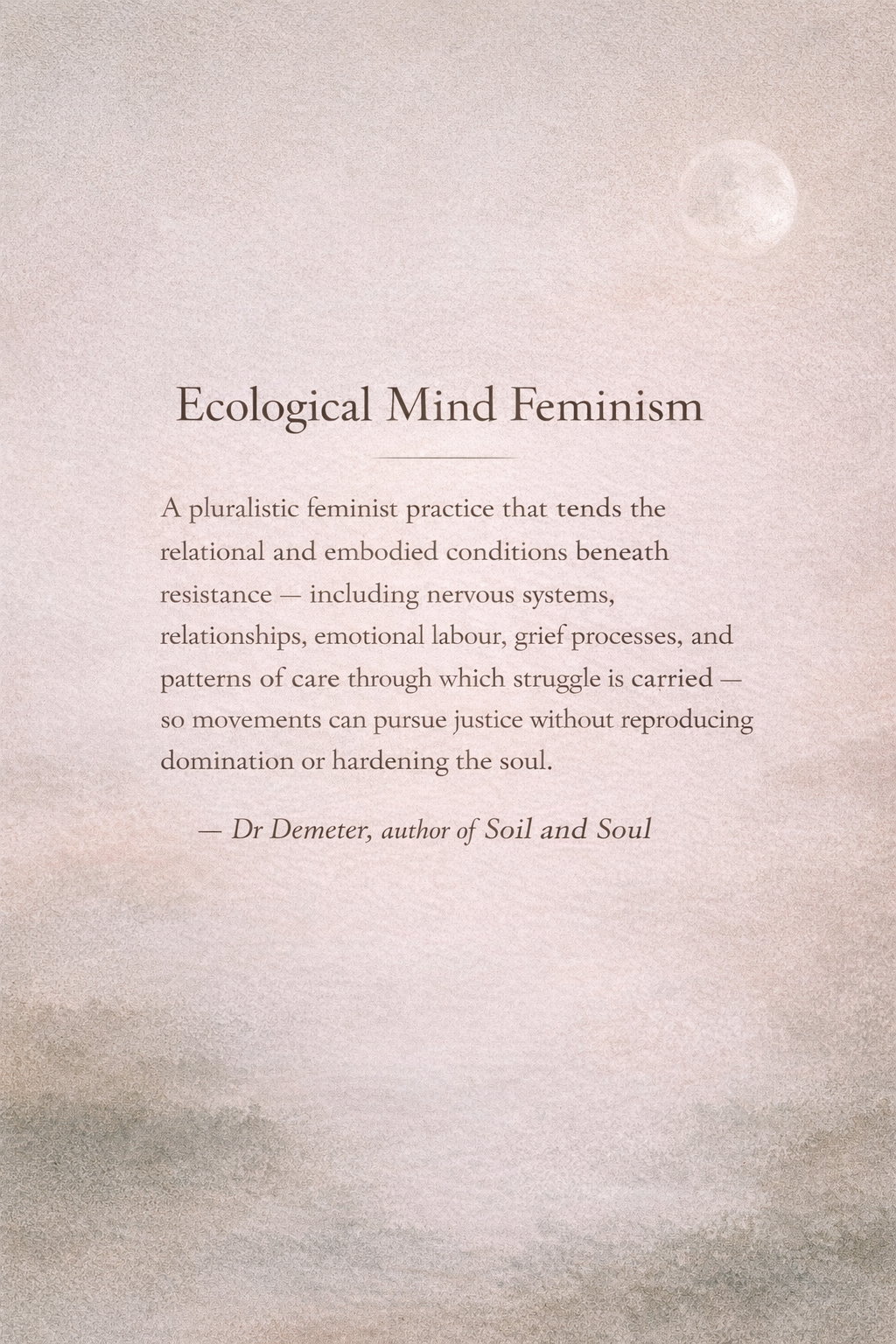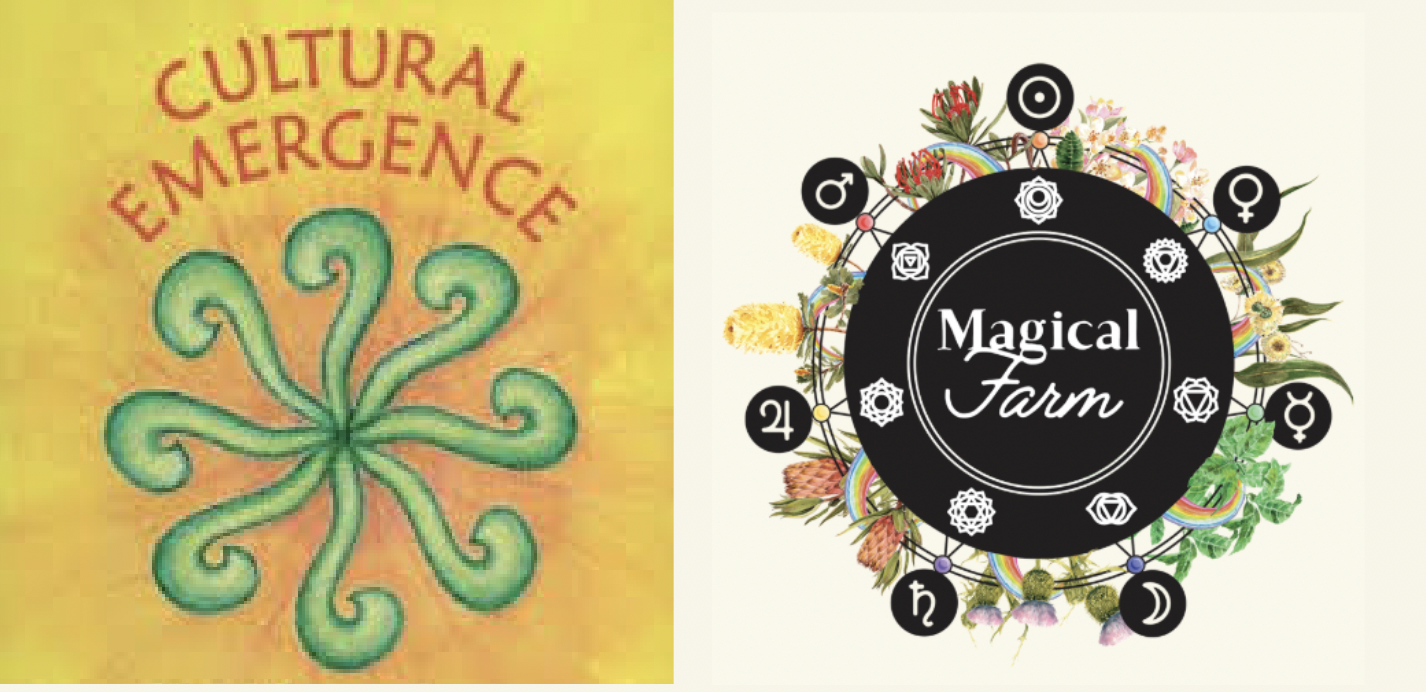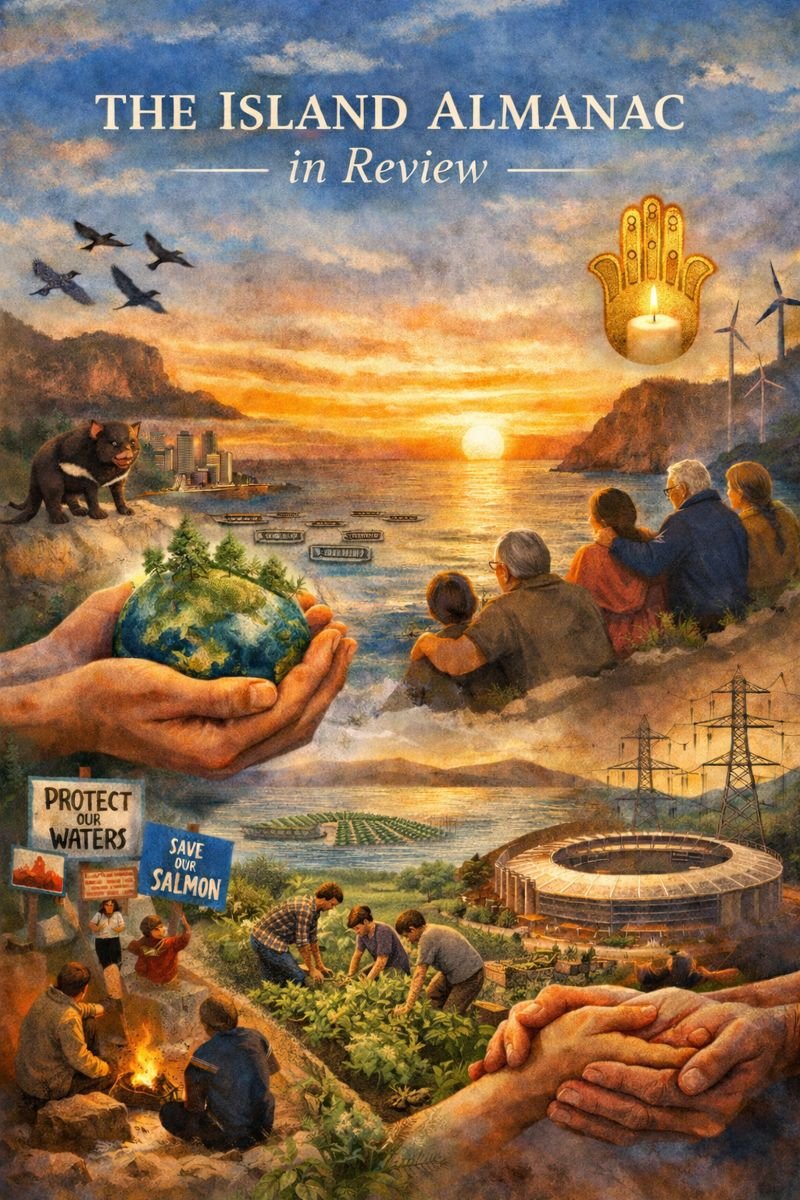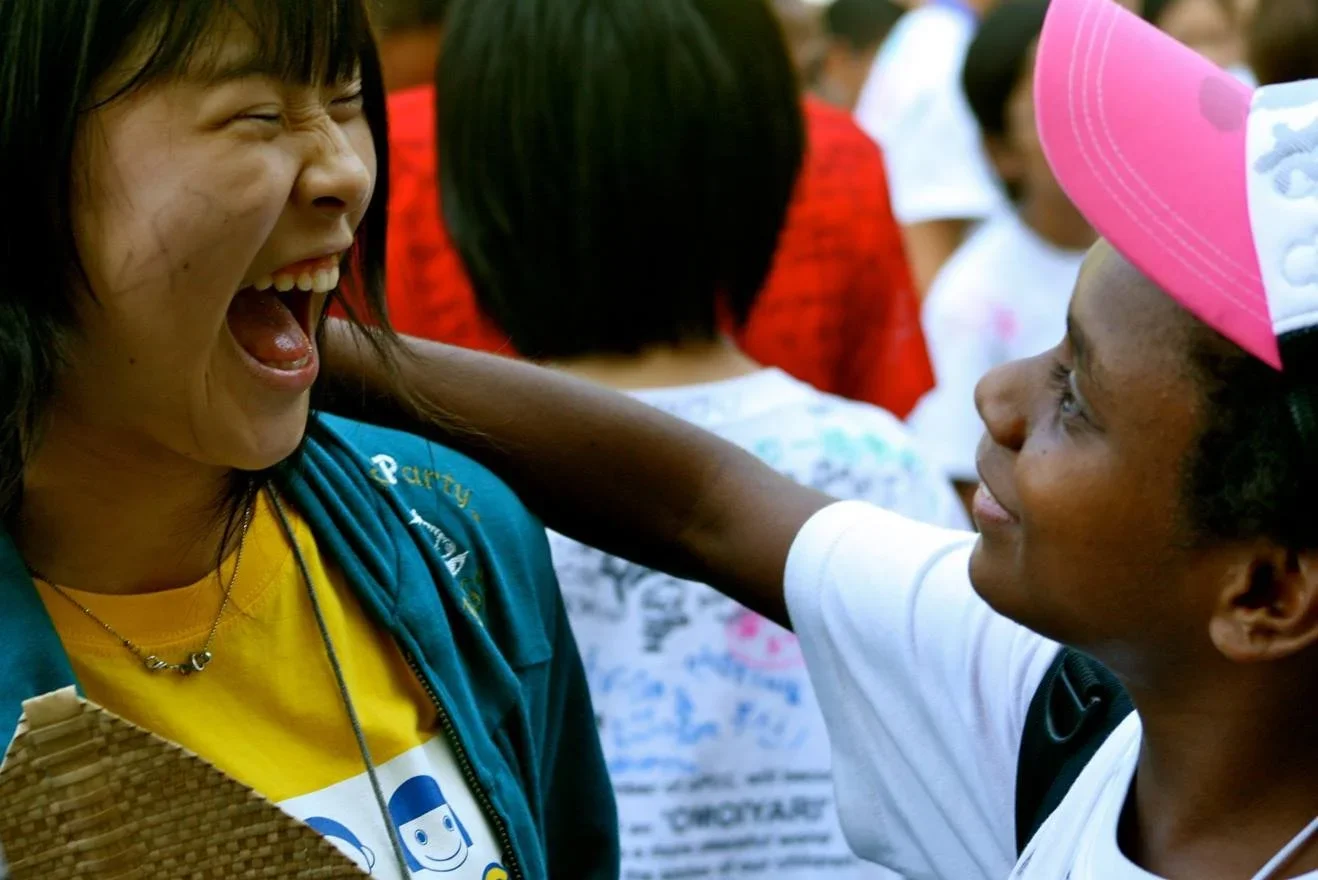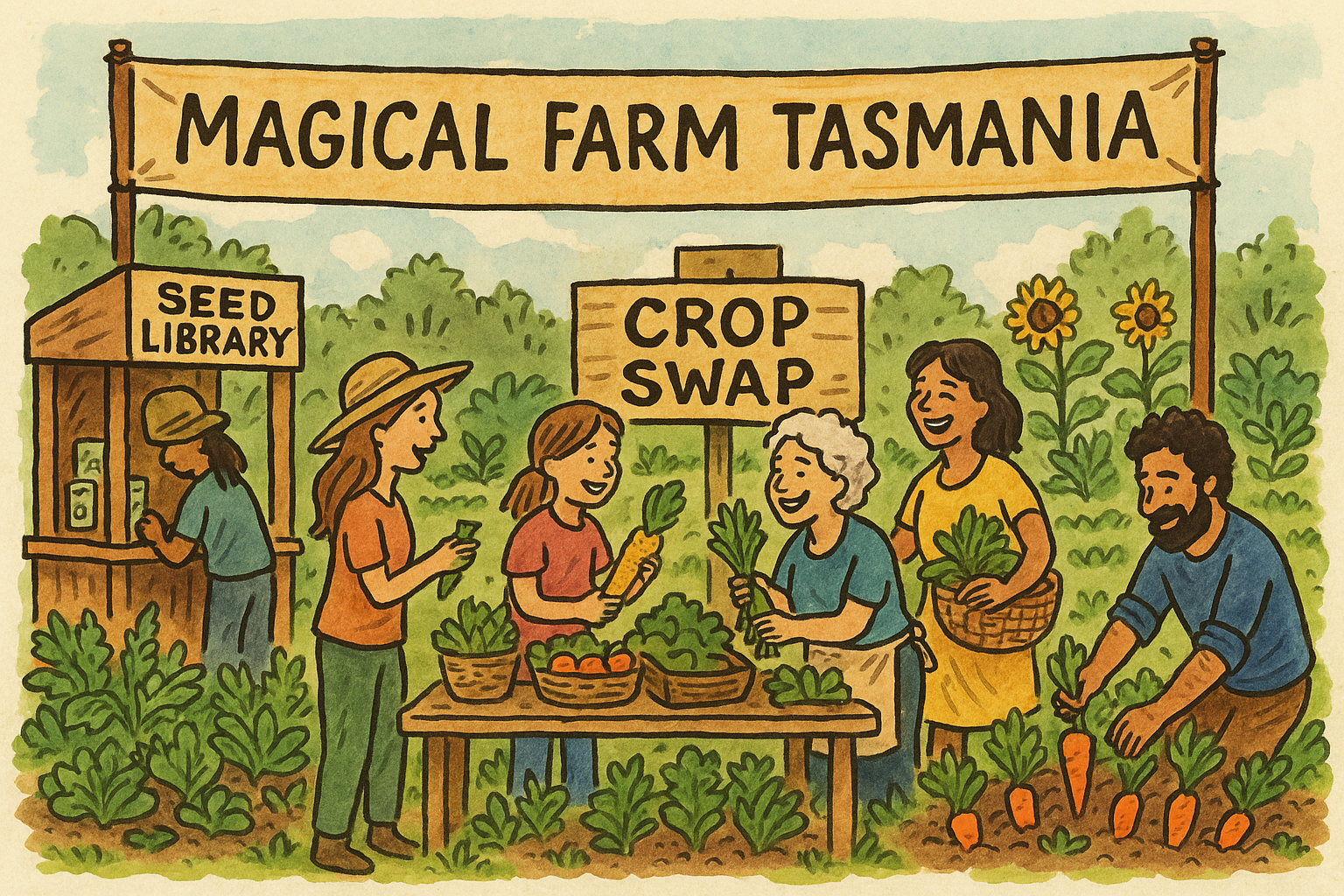“We weave ideas, scribe forward, align with life and create connection.”
— Dr Demeter | Emily Samuels-Ballantyne
Covering topics on Foundational Economics, Convivial Governance, Anthroposophic Philosophy & Everyday Regeneration in Tasmania
Overview
The Island Almanac is a living compendium of stories, tools and place-based examples that weave together foundational economics, anthroposophic wisdom and the rhythms of everyday life. Rooted in the soils of Tasmania and flowering from Magical Farm Tasmania. Across its pages you’ll find:
Practical essays on redirecting public and private wealth into community resilience
Anthroposophical reflections on seasonal rhythms, ritual and soul-led innovation
Tasmanian case studies from coastal hamlets to mountain valleys
Project spotlights on island-wide initiatives, from seed libraries to solar co-ops.
Living Architecture: A dynamic framework of interconnected practices, food, housing, energy, governance, culture, activism and economics that grows, adapts and breathes like an ecosystem, rather than standing as static policy or infrastructure. These seven pillars form the Living Architecture of Regen Era Design Studio & The Island Almanac: integrating heart, head & hands to power a truly regenerative future.
Food, Plants and Planets
Housing and Natural Building
Energy
Community Life, Learning & Culture
Sacred Activism
Convivial Governance
Regenerative Economic Design.
Feed Tasmania from Tasmania: Hard Policy for a Living Local Food Economy
Tasmania’s food future will not be secured by more strategy documents, but by direct, practical investment in the people and infrastructure that grow and distribute food locally. This article argues for “meaty” policy that pays small and medium farmers to feed their regions, mandates local procurement for public institutions, funds shared regional infrastructure, unlocks access to land, and provides patient community finance. By treating local food production as essential economic infrastructure, Tasmania can rebuild soil, strengthen regional economies and create a resilient food system grounded in place rather than paper.
Open and Woven: Reweaving Local Life for a Living Future
Synopsis: Open and Woven: Reweaving Local Life for a Living Future
Dr Emily Samuels-Ballantyne / Dr Demeter | Regen Era Design Studio
This article traces how SLOC: Small, Local, Open and Connected design scenario by Ezio Manzini names a long-standing pattern of resilience found in healthy villages and neighbourhoods, and why it remains vital for Tasmania, Australia, and the communities Emily now re-enters in Europe. Drawing on Creative Communities research, Illich’s conviviality, and social permaculture, she argues that everyday life is a design field where soil, society, and spirit meet.
“Small” becomes intimacy and accountability, “local” a lived belonging, “open” the capacity to learn without losing boundaries, and “connected” (or woven) the mycelial intelligence that allows communities to exchange strength without being swallowed by larger systems. Emily diagnoses the cultural thinness produced by centralised food systems and shows how local growers, village rhythms, and seasonal literacy are eroded when food is abstracted from land and relationship.
From this lineage she introduces Con Viv, her living-systems design approach, and the Grow Small Feed All campaign, which aims to support micro farms and neighbourhood food networks through policy, micro-finance, and civic imagination. She emphasises that openness must be paired with equity to avoid gentrification and displacement, and that convivial systems strengthen dignity rather than extract value.
Holding an anthroposophic sense of society as a living organism, she invites designers, policymakers, activists, growers, and neighbours to treat daily life as a legitimate site of design, and to cultivate a woven future, grounded, porous, equitable: where community life becomes strong enough to hold us all.
When the Field Can Breathe Again
This article reflects on the unseen costs of constant vigilance in contemporary movements for justice, exploring how prolonged protection can harden the soul and erode relational warmth. Drawing on the symbolism of the Cancer full moon and Venus in the underworld, it offers ecological mind feminism as a pluralistic practice that tends the relational and embodied conditions beneath resistance, supporting forms of activism that remain strong without losing their humanity.
Cultural Emergence at Magical Farm Tasmania Sunday January 18th 2026
Cultural Emergence at Magical Farm on Sunday 18th Jan 2026 is an invitation into a different kind of change-making, one that treats culture as a living system shaped by what we practice repeatedly, not just what we believe or argue about. Blending social permaculture, breathwork, forest therapy, and practical life-design tools, the workshop offers a grounded day of re-patterning attention toward what grows trust, resilience, and real belonging. It’s for anyone feeling the strain of our times and craving a space that can hold complexity without hardening, where ecological intelligence becomes embodied, relational, and replicable, and where hope is practiced into existence together.
A Year of Reweaving: Notes from The Island Almanac, 2025
In 2025, The Island Almanac became a living record of a place under pressure, and a steady refusal to let pressure collapse us into binary thinking. Moving through the year’s rupture-points (from public grief and violence to contested megaprojects, salmon industry harms, energy transition conflict, and the quiet intensity of a widening mental health crisis), the writing traced a deeper pattern: when systems harden, people harden too, unless we deliberately rebuild the village layer of life, relationship, meaning, practical competence, and shared care.
Across essays on convivial governance, foundational economics, regenerative culture, and what I call Ecological Mind Activism, the Almanac argued for a shift from activism as constant alarm to activism as ecological intelligence, measuring effectiveness not only by what we oppose, but by what we can grow: real alternatives, replicable practices, and everyday lives less dependent on extraction. At its heart, this body of work offers a new narrative for Tasmania: not a fight for the “right side,” but a practice of reweaving, where grief becomes a doorway to repair, conflict becomes a catalyst for better containers, and the future becomes something we build together, one living pattern at a time.
Omoiyari 思いやり in a Time of Grief: From Outrage to the Work of Reweaving
In a time of shared grief across the Great Southern Land, this essay asks what it would mean to move from outrage into the slower work of reweaving. It explores how modern conditions, and the algorithms that amplify them, can push communities into hardened binaries when core human needs for protection, affection, participation, and identity feel unmet. Drawing on Manfred Max-Neef, Anthroposophy, and Steiner’s threefold social understanding, it offers a practical map for cultural repair through renewed cultural life, dignified rights life, and cooperative economic forms. Grounded in the Japanese ethic of omoiyari 思いやり, and shaped by respect for First Nations relational wisdom, it closes with an invitation to rebuild the village layer through simple, repeated practices that thicken trust and make belonging possible again
Ecological Mind Activism
This article challenges the dominant narrative of environmental activism by reframing the krill crisis through the deeper lens of food systems, ecological identity and regenerative community practice. It argues that industrial krill extraction is not only an oceanic tragedy, but a symptom of depleted soils, hollow food cultures and lifestyles disconnected from place. Drawing on Tasmanian case studies and place-based scenarios, the piece offers an imaginal pathway where nutrient-dense local foods, herbal traditions, community renewal schemes and land-sea reciprocity dissolve the demand for krill-based supplements altogether.
The article critiques the performative tendencies of modern activism: the adrenaline, spectacle and “thrill to save krill” and calls for a new paradigm grounded in slowness, competence and systemic cultivation. Integrating Freya Matthews’ ecological self theory with the author’s Convivial Self theory, it introduces Ecological Mind Activism: an approach where activists embody the ecological mind while practicing the convivial skills needed to regenerate community systems, redirect public funds toward life-enhancing projects and rebuild local food autonomy.
Through the work of Regen Era Design Studio, the article demonstrates how these principles can be applied in real places, offering practical tools for moving beyond resistance into renewal. Ultimately, it argues that environmental action must evolve from fighting extraction to cultivating the cultural and ecological conditions that render extraction unnecessary, inviting a shift from performance to praxis, from urgency to attunement, and from crisis to regeneration.
Scenario Two Returns: A People’s Stadium for Tasmania
Tasmania is being asked to accept another top-down, corporate megaproject—this time a stadium shaped more by AFL interests than community wellbeing. Drawing on the legacy of Scenario Two – Powering Regeneration, this article offers seven alternative visions rooted in Designing with Country, justice, imagination and local place-making. These scenarios show how investing outside Hobart’s CBD, into Glenorchy, Bridgewater/Gagebrook, Shorewell Park, Risdon Vale or a retrofit on the outskirts, creates regeneration rather than displacement. First Nations leadership, diverse sports, food-growing, arts, youth programs and wellbeing ecosystems become the real legacy. Scenario Two reclaims public investment for the highest good of all Tasmanian’s, proving a stadium can uplift rather than extract.
Born From the Ashes: A Scorpio New Moon Reflection on Origins & Becoming
This Scorpio New Moon brought a revelation that quietly rearranged the inside of my life. I have always known I was born in ‘that village’ during Ash Wednesday. The stories of fire and vigilance were part of the atmosphere I grew up in, like a mythos that lived in the soil. I was a child who watched the sky, who tightened inside when the wind swung around, who wanted us to leave early on fire-danger days. That instinct lived within me… One major reason is because I was always aware that 18 CFA firefighters died only one kilometre from where I grew up, taken by the Ash Wednesday firestorm. And soon after, another truth surfaced: I was conceived just two months later, in a landscape still smoking, grieving, and trying to regrow itself.
THE VILLAGE WE ARE LOSING
In this reflective essay, Dr. Demeter (Emily Samuels-Ballantyne) explores the shadow of gossip and emotional isolation that shapes many rural Tasmanian communities, and how these patterns undermine belonging, creativity, and the wellbeing of individuals and families. Drawing on the Roseto study, her lived experience in a small valley, and the relational intelligence of lutruwita Tasmania’s First Peoples, she argues that the island has the landscape for community but not yet the culture. Through Con Viv relational theory and grounded personal insight, she calls for a renewal of village life built on conversation, emotional literacy, reciprocity, and cross-cultural wisdom. This is a compelling invitation to transform the island’s social fabric from quiet surveillance to genuine connection: valley by valley, neighbour by neighbour.
Beauty Without an Agenda: The Inner World Mirror
(Companion to “Healing the Shadow of Stolen Land - piece to read after here” by Dr Demeter)
Healing the Shadow of Stolen Land explores the wounds of civilisation and the outer work of reconciliation, Beauty Without an Agenda turns inward, toward the tender soil of the self. It is the inner mirror of regeneration: a meditation on embodiment, self-worth, and the beauty way.
Drawing on the wisdom of Carl Jung, Rudolf Steiner, Tyson Yunkaporta, Joanna Macy, and the living presence of Yarrow, the Venus-Chiron plant of integration, Emily Samuels-Ballantyne (Dr Demeter) traces how healing the Earth is interconnected within the body.
Where the first essay speaks of land, policy, and collective renewal, this companion piece listens to the body as microcosm of the planet: the place where shadow meets light, breath meets soil, and communication becomes presence.
Chiron’s myth weaves through both, in the outer story, as the healer confronting the wound of civilisation; in the inner, as the voice reclaiming worth through embodiment. Together, these essays form a single ecology of thought and feeling, the Outer and Inner Mirrors of regeneration, inviting us to heal not just the world we walk upon, but the one we carry within.
Healing the Shadow of Stolen Land: Jung, Steiner, Yunkaporta & Macy on Restoring Peace
In a time when the phrase “No peace on stolen land” echoes across the world, this essay explores how four visionary thinkers Carl Jung, Rudolf Steiner, Tyson Yunkaporta, and Joanna Macy illuminate a pathway toward true reconciliation.
Drawing on depth psychology, spiritual ecology, Indigenous pattern thinking, and collective activism, Emily Samuels-Ballantyne (Dr Demeter) reveals that peace cannot be legislated or imposed; it must be grown from within, through the healing of psyche, spirit, culture, and community.
From Jung’s call to integrate the shadow, to Steiner’s vision of sacred balance, to Yunkaporta’s custodial worldview and Macy’s Work That Reconnects, the essay weaves a tapestry of wisdom that transforms the pain of history into a praxis of renewal.
Rooted in the living work of Magical Farm Tasmania and the embodied practice of YoFence, Emily offers a model of regenerative reconciliation, where healing is not an idea but a way of life: a daily tending of relationship between people, place, and planet.
“Peace is not achieved by avoiding the wound, but by tending it.” Dr Demeter
Tarkind: Painting a Living World Back Into View
Life works in relationships. Tarkind invites people to feel that truth in place. Born in 2022 from a mum and son, a field biologist, and a palawa artist, our Hobart-based collective weaves science, story, and art so care becomes culture. Inspired by living-systems thinking (Capra) and design for regeneration (Wahl), we walk and notice with iNaturalist, paint what we find so the insight lands, then plant and repair so places grow more resilient. This head, heart, and hand practice, echoed by Orr and Satish Kumar, builds tolerance, everyday care, and quiet reverence. We partner with the Great Southern BioBlitz each spring. Join us Sunday 26 October 2025 at Magical Farm and Allens Rivulet. Bring curiosity, a notebook or phone, and something to paint on.
From Clash to Pattern: A Living Systems Guide
Dr Emily Samuels-Ballantyne argues that communities don’t fail because people disagree; they fail when disagreement has nowhere useful to go. Drawing on Con Viv (head–heart–hand alignment), Jung’s idea of the “Third,” and Anthroposophy’s threefold social order, she reframes conflict as a constant input that can be metabolised into capacity. The article outlines practical containers, listening spaces that surface facts, rights processes with visible decision rhythms, and small, time-boxed pilot projects, that turn heat into shared work. Rather than “being nicer,” it proposes love as infrastructure: clear lanes between cultural freedom, equal rights, and mutual economy, plus simple cycles of notice → propose → trial → review. The result is a pattern language for civic care where friction becomes fuel and culture grows through practice.
Stop Funding PDFs. Start Funding Patterns.
This essay argues that Australia’s resilience work is over-documented and under-practiced. Drawing on a database of thousands of local food policies and current state/federal funding streams, it proposes a shift from writing strategies to funding “patterns”: small, hosted experiments that turn one policy clause into a safe, repeatable practice, seed libraries and crop-swaps, cool-evening street meals with tree-watering rosters, neighbourhood preparedness walk-throughs, and similar low-overhead trials. Framed by Con Viv (“with life”) and threefold social theory, the piece outlines how councils and communities can run micro-trials with clear edges, light measures, and a one-page “how we did it” so others can copy. It closes by asking governments to reserve a modest slice of existing budgets for facilitation, prototyping, insurance templates, and pattern-writing, so resilience moves from paper to everyday life.
Imagining Healing: The Third Path for Tasmania
Tasmania’s debates over aquaculture, forestry, and energy are framed in binaries: jobs versus environment, growth versus preservation. These divisions fracture not only politics but also communities and inner life.
Drawing on Rudolf Steiner’s idea of the hardening of the soul and Carl Jung’s call for the Third, this article argues for a new orientation beyond opposites. The Third space is not neutral but generative, where ideas compost into gardens, strategies translate into action, and governance is rooted in transparency and practice.
Through threefold social theory, cultural freedom, political equity, and economic mutuality the piece highlights how projects like food hubs, biodynamic farms, and cooperatives act as acupuncture points in the social body. Supported by eco-feminist perspectives and the symbolic guidance of yarrow, rosemary, and nettle, these initiatives show how imagination can become infrastructure.
This is not a time for mediocrity, so Tasmania has the scale and creativity to pioneer a regenerative future, reweaving narrative, soul, and community into politics, economics, and culture.
The Wound, the Third, and the Healer: A Virgo New Moon Reflection
This reflective essay explores the middle east conflict, through a Jungian and symbolic lens, guided by the Virgo New Moon and the healing presence of Archangel Raphael. Rather than offering political solutions, it invites a deeper psycho-spiritual engagement recognising that much of the global discourse is shaped by projection, ancestral trauma, and collective shadow. Drawing on Carl Jung’s concepts of the Third, the Anima, and Chiron, the piece suggests that while the path to geopolitical reconciliation may be blocked, a healing space must first be cultivated within the individual and collective psyche.
It calls for discernment, humility, and the courage to hold paradox, to grieve both sides of the story, and to recognise how personal pain and moral injury are entangled in global reactions. The Virgo archetype, as a guardian of ritual, earth, and care, offers a path of slow healing through tending, presence, and sacred attention. The piece closes with plant allies Yarrow (Achillea millefolium) and Rosemary (Rosmarinus officinalis) as symbolic and energetic supports for this inner work, yarrow for integration and boundary, rosemary for clarity and remembrance suggesting that healing begins not in resolution, but in the quiet act of soulful witnessing.
Beyond the Hashtag: Why Progressive Platforms Must Build Futures, Not Just Protest
In an era dominated by viral outrage and moral clarity, progressive leaders face a critical choice: remain commentators or become architects of the future. This article argues that beyond calling out injustice, whether in situations of War, Tasmania’s salmon farms, or threatened forests there lies a responsibility to foster convivial governance. By inviting communities into genuine, participatory conversations, and using imagination as a core democratic organ, movements can co-create sustainable, inclusive futures. Drawing on global examples like Barcelona’s Decidim and EcoPeace Middle East, the piece calls on platformed activists to move from critique to collaborative scenario-building, ensuring that the “day after” belongs to those who build it.
About the Author
Dr Emily Samuels-Ballantyne (also known as Dr. Demeter) is an eco-philosopher, farmer, and author of the forthcoming series The Spiral Shelves: Living Library of Magical Farm Tasmania. Her work bridges policy design, ecological healing, and the spiritual-cultural renewal of place. She works at the intersection of community resilience, regenerative governance, and embodied stewardship, inviting new myths and models for living well together in times of great change.
Holding Paradox, Healing Wounds, and Bridging Inner and Outer Worlds
In a world fractured by war and ideology, this essay explores the psychological, spiritual and manifested cost of binary thinking, especially in relation to the Israel-Palestine conflict. Drawing from Jung’s concept of the transcendent function, Marx’s critique of alienation, Levinas’ ethics of eye contact, Escobar’s pluriversal design is not about flattening difference, but about making room for many worlds to co-exist and the symbolism of Chiron and Venus, it calls for the restoration of the “Third”, a space where paradox and pain can coexist without annihilation. Dr Demeter weaves personal reflection with collective insight, highlighting how language itself can wound or heal, and how imagination, as described by Steiner and Einstein, is a vital organ for integration and transformation. Yarrow, specifically Achillea millefolium, is offered as both a literal and symbolic remedy for those seeking to hold complexity, bridging intellect and embodiment, activism and reverence.
Ultimately, the essay invites a shift from slogans to soul, from splitting to staying, and from conclusion to container, where a new, reconciliatory future might take root.
Who Counts As a Farmer? And why it matters for the future of our regions.
This piece by Dr Demeter (Emily Samuels-Ballantyne) explores the urgent need to redefine who counts as a farmer in Australia’s evolving agricultural landscape. It highlights how current government support programs like the Farm Household Allowance largely exclude small-scale, regenerative, and community-based farmers, many of whom are young people building resilient regional economies through diverse, place-based food systems. The article calls for policy reform that values ecological health, social wellbeing, and cultural vitality alongside traditional economic measures, urging recognition and support for the farmers shaping a reenerative future.



